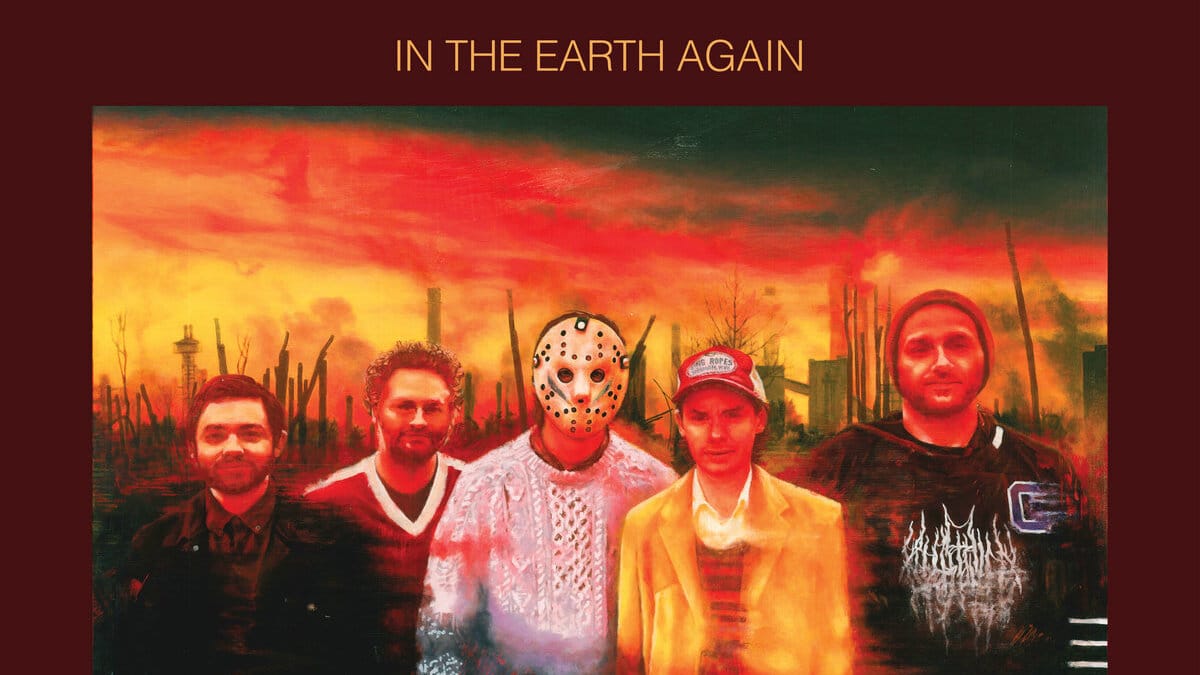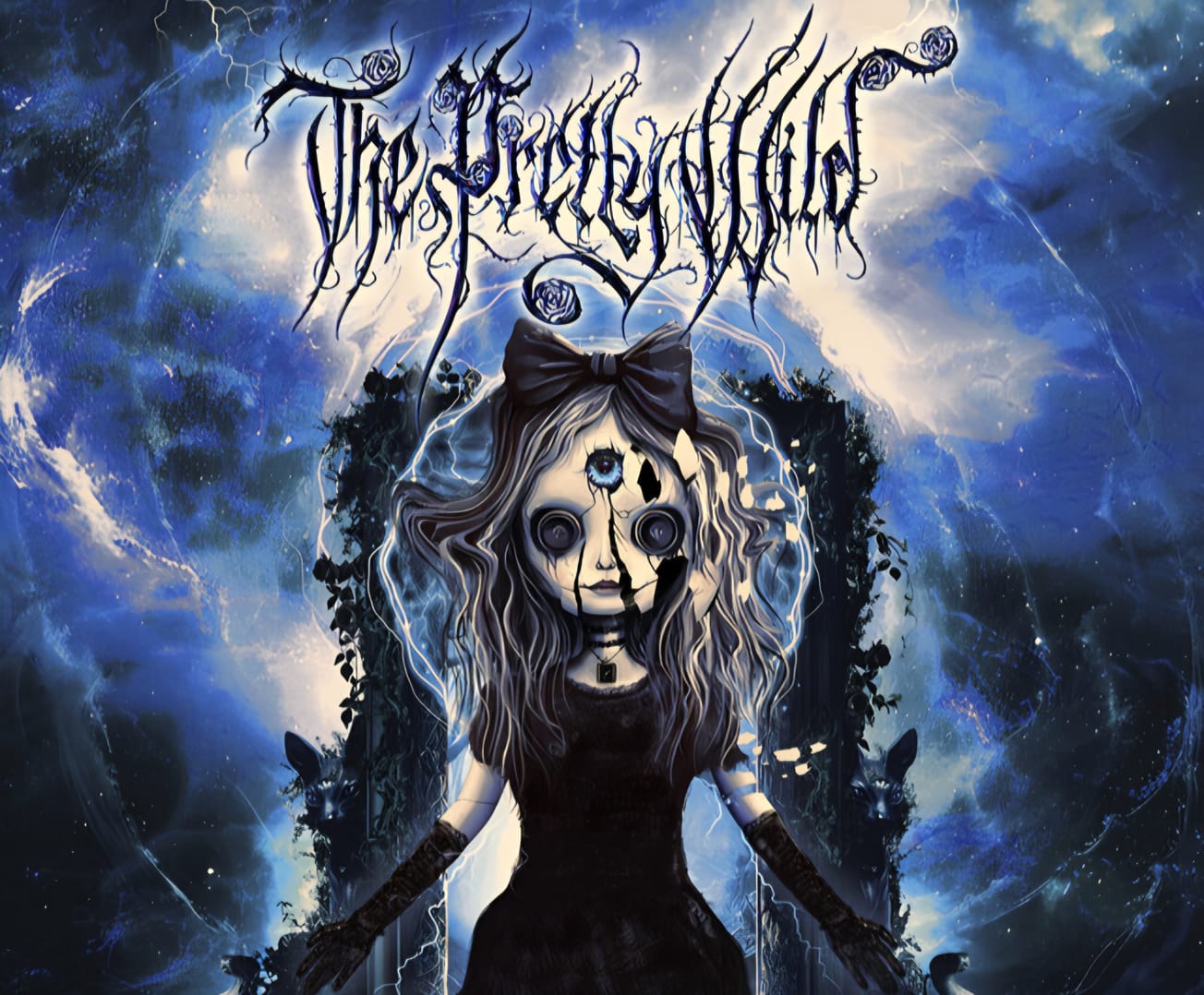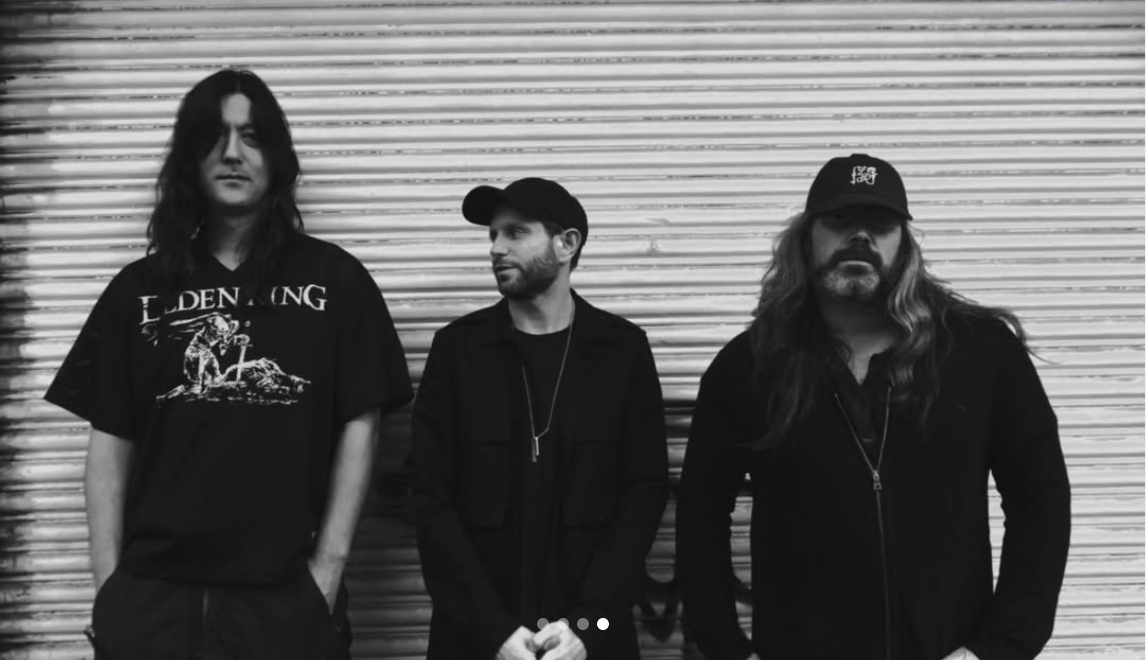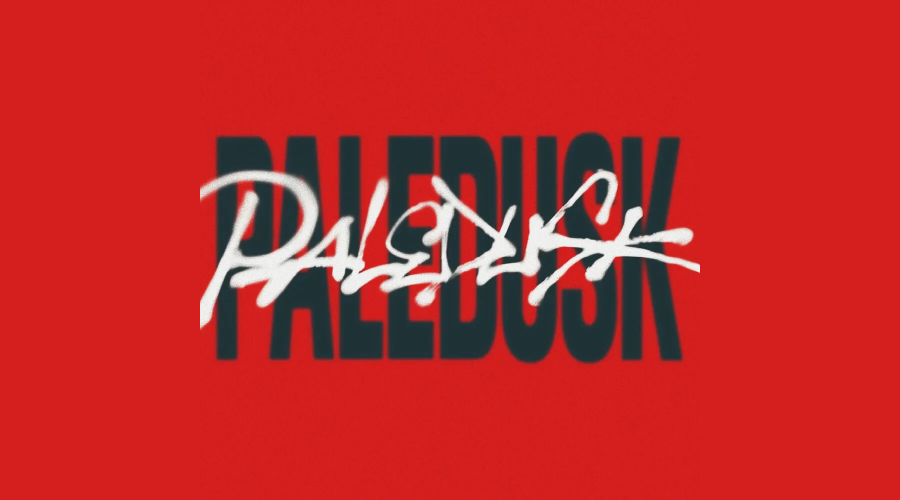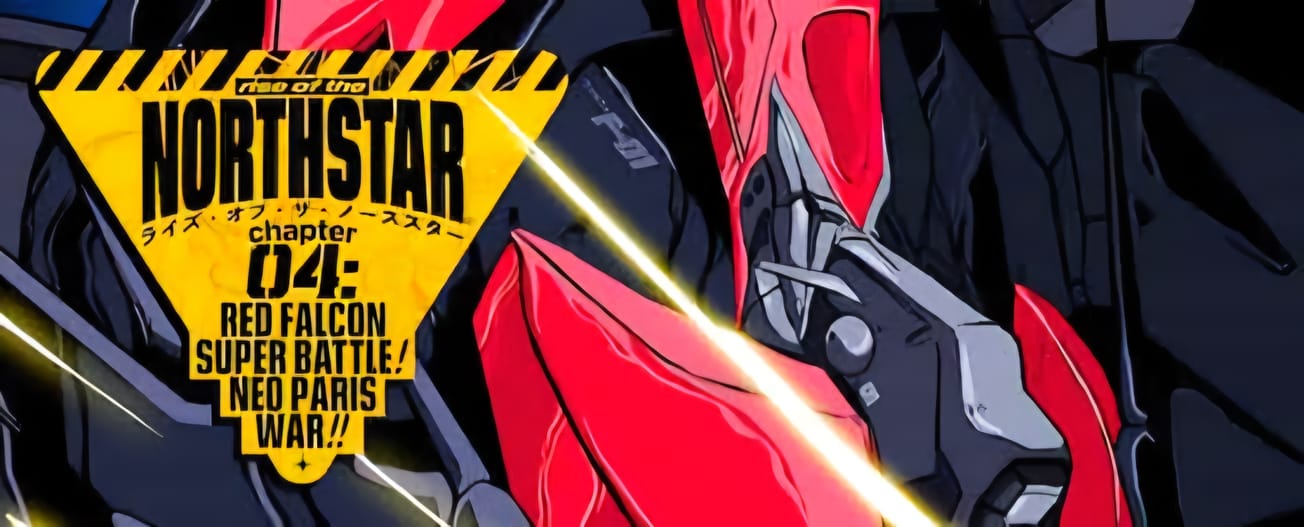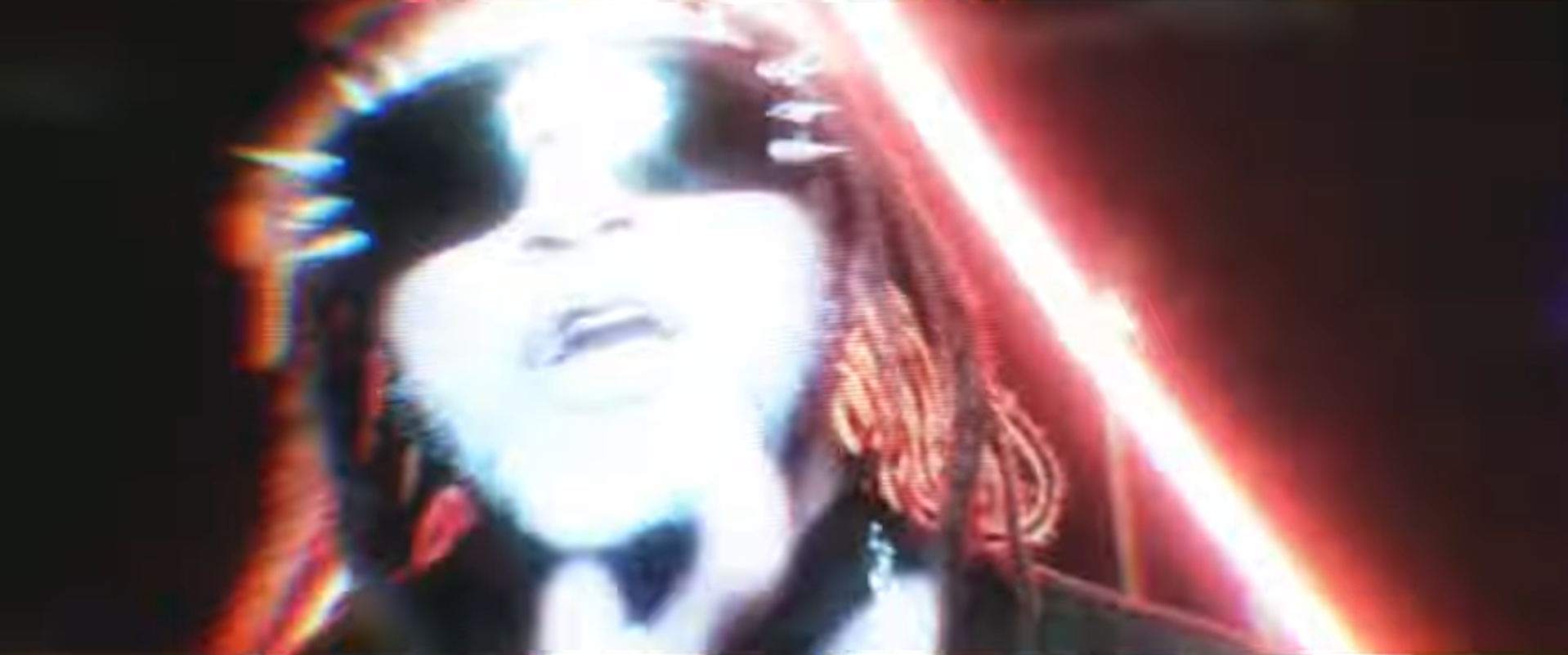"When the Lamb opened the fourth seal, I heard the voice of the fourth living creature say, 'Come!' I looked, and there before me was a pale horse! Its rider was named Death, and Hades was following close behind him. They were given power over a fourth of the earth to kill by sword, famine and plague, and by the wild beasts of the earth."
- Revelation 6:7-8 (New International Version Bible)
Referenced, alluded to, and invoked aurally throughout, this passage sets the tone for In The Earth Again, the new album from Chat Pile and Hayden Pedigo. Their first collaboration with the Amarillo-based avant-garde guitarist, In The Earth Again finds the celebrated noise rockers turning their sludgy gaze toward the apocalypse–how it's happening, why it's happening, and what it will leave behind. In doing so, the band pinpoints nothing so much as what makes us human and what makes a select few among us so inhuman(e).
The opening track, "Outside," weaves a bed of looping fingerpicked guitars with an unassuming field recording of bugs chittering in the grass. The first of five instrumentals, it grounds the listener in a serene, idyllic sense of place. Given the band's previous album openers, the prolonged lack of dissonance and distortion, or even the band's rhythm section, is surprising.
But that serenity is quickly disquieted by "Demon Time," the first single. It's here the band lay out the album's thesis: "Hey stupid eyes / There's no turning back now / I don't wanna be inside / All the castles of the world will burn / But someday all the demons will return / And they will find you / And they will fuck you up." Since the band's inception, Chat Pile have held a mirror up to the atrocities of everyday life: homelessness, gun violence, livestreamed genocide. While there's the distinct sense that things will continue to get worse, Chat Pile have to forethought to look beyond the economic/societal/environmental collapse to the retribution that will surely follow. For every action there is an equal and opposite reaction.
Musically, the track is equally foreboding. A clean, western-tinged guitar figure is soon met with a doom metal-y, distorted riff that hangs in the air, casting a dark shadow over the track. The punchy up-tempo energy that animated Cool World has been stripped away, revealing something desolate and haunting. That sense of desolation kicks into full gear on "Never Say Die!" when the bass and drums finally appear, lurching underneath a tangle of wiry guitar arpeggios. Marked by a deliberate pace and dual vocals from Raygun Busch–one track singing, one screaming from the backdrop–the song places the blame for all this death and destruction at the hands of the privileged few exploiting and profiting off the suffering of others. Bereft of any semblance of hope, Busch can only warn "Don't be caught by the revelation / Don't get crushed under the violent wheels of change." It's here, during the song's bridge, where the album likely gets its title: "And to the few that are blessed / With the last days of our kind / Down in the holes of the earth / There's nothing but time / I know, but I still wonder why." Those who have doomed us will surely seek refuge down in the deep, dark earth from whence they came. The dark irony is almost too much to stomach.
The second instrumental, "Behold a Pale Horse" suggests the previous track's warning may have come too late. The sad beauty of Pedigo's processed guitars is once again taken over by a wave of distortion that comes in and out like a wave. Not the pounding grit of the band's early EPs nor the cold clanging of God's Country and Cool World, these guitars drift in, brittle, seething, ashen. It's as if the very air is unsafe to breathe. The way the song dissipates, seemingly without warning, only underscores the senselessness of all this death and suffering.
"The Magic of the World," is the first track to look beyond the wanton suffering, exploring what will be left in its wake. A heartbreaking acoustic ballad, it's easily the prettiest thing Chat Pile have put to tape. In it, Busch imaging himself surviving underground, comforted by the memories of the people he loves. It's only here, at the end of the world, that what's most important snaps into focus: human connection. From here, the album returns, in "Radioactive Dreams" and "A Tear for Lucas," to notion of holding close to the people we love. The former sees the band's guitars taking on soaring, shoegaze-sized proportions, while on the latter, Busch gives his most emotional, affecting performance. Singing of "boundless chance and inherent grace" he's audibly on the verge of tears. At this point, with everything that's at stake, Chat Pile are long past the point of subtlety. The album's back half is divided between naked emotion, experimentation, and rage–the latter giving way to, arguably, the album's darkest insight.
The sound piece "Fission/Fusion" underlines the album's theme of looking at the apocalypse from both sides by evoking not just Robert J. Oppenheimer's Trinity bomb test but also the strange daze that followed. Likely inspired by Christopher Nolan's Oscar-winning blockbuster Oppenheimer, it's telling how even the band's pop culture references have taken a darker, more direct turn. "I've Got My Own Blunt To Smoke" reads like a cheeky one-off, but the forlorn guitar instrumental suggests that, in the world of Chat Pile, turning down a blunt is as good as sign as any that human connection is headed for extinction.
The epic, seven-minute "Matador" is undeniably the album's peak. Named for the Spanish word for "killer," and referencing bullfighting, card games, and/or the world's first surface-to-surface cruise missile, capable of carrying a nuclear warhead, the track is classic Chat Pile. An extended intro of thrumming noise and painful ringing, panned hard left and right, gives way to a driving fury not seen from the band since the heavier moments of God's Country and "Why" in particular. Understandable given the subject matter. Throughout, Busch considers his obligation to carry on his loved ones' memories, struggles to hold onto his very sanity, and pinpoints what, deep down, drives the rampant greed and destruction. As "the second sun"–how eyewitnesses described the atomic blast of the Oppenheimer's Trinity test–melts his eyes, Busch asks, simply, "Are you afraid of the dark?"
What's surprising, and refreshing, is how little of In The Earth Again is spent explicating these bastards. Everything down to the schoolyard level name-calling suggest those responsible are not great mysteries to be solved. No byzantine prism of justifications. No layers to be peeled back. No, it simply paints those responsible for the world's ills as stupid, and, perhaps most damning, afraid to confront life's quotidian horrors. In pinpointing what these monsters lack, Chat Pile have once again redefined their sound and crafted a moving, uniquely harrowing celebration of humanity.
In The Earth Again is available now via The Flenser.


